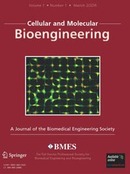Cellular and Molecular Bioengineering

Editor-in-Chief: Michael R. King
Publication Editors
ISSN: 1865-5025 (print version)
ISSN: 1865-5033 (electronic version)
Cellular and Molecular Bioengineering is an official journal of the Biomedical Engineering Society, publishing original research that advances the study and control of mechanical, chemical, and electrical processes of the cell. A key challenge in improving human health is to understand how cellular behavior arises from molecular-level interactions. The field of cellular and molecular bioengineering seeks to understand, so that we may ultimately control, the mechanical, chemical, and electrical processes of the cell.
The aims of this journal are to publish experimental and theoretical studies that advance our understanding of (1) the biomechanics of cells, including their interaction with the extracellular environment, and of biomolecules, including proteins, lipids, polysaccharides, and nucleic acids; (2) the chemical thermodynamics, kinetics, and transport processes associated with biomolecular interactions and cellular processes; and (3) electrical processes that underlie cell behavior. In addition, an overarching aim is to integrate our understanding of mechanical, chemical, and electrical processes to better understand the integrated, systems nature of cellular processes.
The scope of this journal includes:
Behaviors of Biomolecule
Studies of how mechanical forces and deformation affect the molecular conformation, binding/reaction, and transport of biomolecules; studies on the structural rigidity of DNA, RNA and proteins under stretching, twisting, bending and shearing and their effects on DNA condensation, gene replication and transcription, DNA-protein/RNA-protein interactions, protein folding and function, protein-protein and receptor-ligand interactions, and studies on the mechanisms of biomolecular motors, biomechanics of subcellular structures and protein assemblies/complexes, and mechano-electrochemical coupling in cells as they interact with their extracellular environment.
Behaviors of Cell
tudies of how cells sense mechanical, chemical, and electrical, events surrounding and within cells, and how cells transduce these events into biological responses. Specifically, studies of how mechanical, chemical, and electrical forces alter cell growth, differentiation, movement, signal transduction, protein secretion and transport, gene expression and regulation; studies of single cell and extracellular matrix behaviors, including their fluid- and mass-transport, viscoelastic properties, cell growth, division, spreading, rounding, crawling, adhesion, and studies on cell cytoskeleton dynamics; cell-cell and cell-ECM interactions.
Computational Modeling of Molecules and Cell
Development and application of simulation models and numerical methods for the analysis, modeling, and prediction of the cell behavior as a function of intracellular and extracellular biomolecular processes. Methodologies include molecular and Langevin dynamics of biomolecules and mesoscopic modeling techniques, as well as multi-scale spatial and temporal modeling and computational methodologies, and seamless coupling of nano-micro-macro scale computational models.
Experimental Methods for Cellular and Molecular Bioengineering
Development of experimental techniques to study the mechanical, chemical, and electrical behavior of cells. Examples include local probes to deform a portion of the cell, for example via atomic force microscopy, mechanical deformation of a single cell, and simultaneous mechanical stressing of a population of cells; methods for studies of single-molecule biomechanics, including the mechanics at the attachment sites, positioning and manipulating of single molecules, imaging and measuring deformation, and applying simple or combined loads; methods for measuring and perturbing the transport and molecular binding interactions via optical, magnetic, or other physical means; advanced techniques for improved electrical measurements in single cells.
Type of Submissions
Cellular and Molecular Bioengineering accepts for publication full-length original research manuscripts, review articles, methods and technical reports, book reviews, rapid communications, and history and teaching articles. All articles must fall within the scope of the CMBE. Authors interested in submitted a review article, book review, or history and teaching article should contact the Editors-in Chief in advance of the article submission.
Online Submissions Here!

